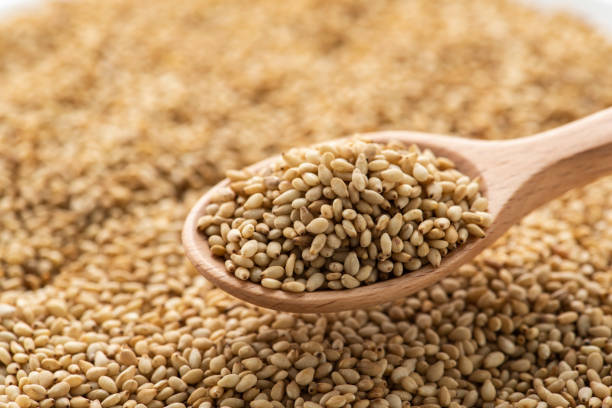The Amazing Benefits of Sesame Seeds
The Amazing Benefits of Sesame Seeds

The Amazing Benefits of Sesame Seeds
Sesame seeds have been a staple in our diets for centuries, and their origin is traced back to Africa and India. These tiny seeds are loaded with nutrients and offer numerous health benefits. Sesame seeds are available in various forms—hulled, unhulled, raw, roasted— and used in cooking, cosmetics, and traditional medicine. This article will explore the benefits of sesame seeds and how they contribute to overall well-being.
Nutrition
A tablespoon of sesame seeds contains approximately:
- Calories: 52 kcal
- Protein: 1.6 g
- Fat: 4.5 g
- Fibre: 1.1 g
- Calcium: 88 mg
- Magnesium: 32 mg
- Iron: 1.3 mg
Sesame seeds contain healthy fats, proteins, and essential vitamins and minerals like calcium, magnesium, and iron.
7 Benefits of Sesame Seeds
Rich Source of Healthy Fats
Sesame seeds are loaded with healthy fats, primarily polyunsaturated and monounsaturated fats, which are good for heart health. These fats help reduce low-density lipoprotein (LDL) levels, commonly called bad cholesterol while maintaining or boosting levels of high-density lipoprotein (HDL), or good cholesterol.
Support Bone Health
Sesame seeds are an excellent source of calcium and phosphorus, vital for bone health. A tablespoon of sesame seeds contains nearly 9% of the recommended calcium intake (RDI). Calcium helps to maintain strong bones and teeth and is important for muscle function and nerve transmission.
Rich in Antioxidants
Sesame seeds contain antioxidants, including vitamin E, phytosterols, and sesamol, a unique antioxidant found only in sesame seeds. Antioxidants are compounds that help protect the body from oxidative stress and free radical damage which contribute to chronic diseases such as cancer, cardiovascular diseases, and age-related degenerative disorders.
In addition, studies have shown that sesamol has anti-inflammatory properties, which may help reduce the risk of developing inflammatory conditions like arthritis. This makes sesame seeds a great food for those concerned with longevity and reducing the effects of ageing.
Improve Digestive Health
The high fibre content of sesame seeds makes them beneficial for digestive health. Dietary fibre is essential for maintaining healthy bowel movements, preventing constipation, and promoting a healthy gut microbiome. Fibre helps regulate blood sugar levels and lowers cholesterol, to ensure a healthier heart.
Sesame seeds contain soluble and insoluble fibres, which work together to ensure proper digestion and absorption of nutrients, making them a great addition to meals aimed at improving gut health.
Support Heart Health
Sesame seeds' heart-healthy benefits stem from their high levels of unsaturated fats, antioxidants, and lignans. Studies have indicated that sesamin, one of the primary lignans in sesame seeds, can lower blood pressure and support cardiovascular health. This lignan, along with the healthy fats found in the seeds, helps reduce inflammation in the arteries and improves circulation.
The magnesium content in sesame seeds also contributes to heart health by relaxing the blood vessels, which helps regulate blood pressure. Regular consumption of sesame seeds can lead to a reduced risk of heart disease and stroke.
Regulate Blood Sugar
For people with type 2 diabetes or insulin resistance, sesame seeds could be particularly beneficial. Their high fibre content slows the absorption of sugar in the blood, helping to prevent spikes in blood sugar levels after meals.
In addition to fibre, sesame seeds contain magnesium, which has been shown to improve insulin sensitivity and lower blood sugar levels. This makes them a smart choice for those looking to maintain stable blood sugar levels and reduce the risk of developing diabetes.
Promote Healthy Skin and Hair
Sesame seeds contain nutrients that are essential for glowing skin and healthy hair. The presence of zinc, an important mineral for skin health, aids in collagen formation, which helps maintain skin elasticity and reduce the appearance of wrinkles. Sesame oil is commonly used in skincare products for its moisturizing properties, and its rich vitamin E content protects against UV damage.
When it comes to hair health, sesame oil has been used in Ayurvedic medicine to nourish the scalp, reduce dandruff, and promote hair growth. The fatty acids in sesame seeds keep the scalp moisturized and strengthen hair follicles, which can reduce hair fall.
Conclusion
Sesame seeds may be small, but their impact on health is substantial. From improving heart health and supporting bone density to enhancing skin and hair health, these seeds are a powerhouse of essential nutrients. Their versatility makes them easy to incorporate into various diets, whether as a topping for salads, mixed into baked goods, or ground into a paste, like tahini. As research continues to uncover more about the benefits of sesame seeds, it’s clear that this ancient superfood deserves a place in your pantry.
